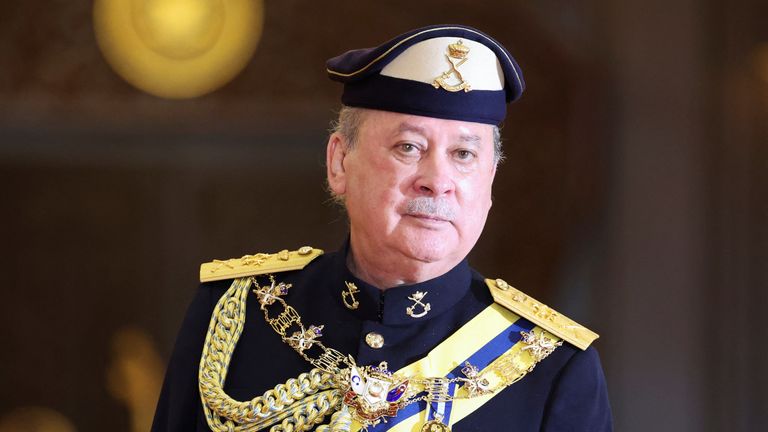Sultan Ibrahim, the affluent and outspoken leader of Malaysia’s southern Johor state, took the oath of office on Wednesday, officially becoming the nation’s new king. Malaysia employs a distinctive rotational monarchy system, where the heads of the country’s nine royal families alternate as the king for a five-year term.
While the monarchy traditionally holds a mainly ceremonial position, it has gained increased significance in recent years amid prolonged political instability. During these periods, the king has occasionally exercised and rarely utilized discretionary powers, adding to the institution’s influence.
Who holds the title of Malaysia’s latest monarch?
At the age of 65, Sultan Ibrahim hails from the historic southern state of Johor, with a sultanate lineage dating back to the 16th century.
Despite the monarchy’s general detachment from politics, Sultan Ibrahim is recognized for his perspectives on governance and claims to share a positive relationship with the Prime Minister. Renowned for his extensive collection of luxury cars and motorcycles, he boasts diverse business interests spanning real estate to mining. One of the companies he holds a stake in has partnered with the struggling Chinese property developer Country Garden for a joint venture, working on the ambitious $100-billion Forest City project in Johor.
The Sultan has been vocal about promoting a special economic zone between Johor and neighboring
Singapore to bolster ties, and he expressed intentions last year to revive a stalled high-speed rail project connecting Malaysia and the city-state.
Adding to the distinctive character of Johor’s monarchy, the sultanate retains the privilege of maintaining its private army—a concession granted as part of the agreement for the state to join the Federation of Malaya before the country’s independence in 1957.
What is the process for the installation of the king?
In one of the world’s largest monarchy systems, nine out of Malaysia’s 13 states are led by a traditional ethnic Malay ruler, commonly referred to as the sultan.
This constitutional monarchy was instituted following Malaysia’s independence from Britain. Every five years, the nine rulers engage in a secret ballot to select one among themselves as Malaysia’s king.
Initially, the order of rotation among the sultans was based on seniority, determined by the duration of their rule. However, this practice was revised after all the royal families completed a term each, and the rotation is now based on the original order.
What authority does the king wield?
The monarch assumes a primarily ceremonial role and serves as the guardian of Islam in the predominantly Muslim nation.
According to the federal constitution, the monarch is obligated to act based on the advice of the Prime Minister and the cabinet, with limited exceptions.
The king possesses the authority to appoint a Prime Minister whom he believes commands a parliamentary majority. This authority, rarely exercised before 2020, is typically reserved for the electoral process of selecting a premier.
Recent political upheavals have compelled the monarchy to assume a more prominent role, particularly during the tenure of Sultan Ibrahim’s predecessor, Al-Sultan Abdullah from Pahang state. Al-Sultan Abdullah appointed the last three Prime Ministers, addressing the aftermath of successive government collapses and, most recently in 2022, selecting Anwar as the premier after a hung parliament election.
Additionally, the king holds the power to grant pardons to individuals convicted. Notably, in 2018, Sultan Muhammad V, the then-monarch, pardoned Anwar, who was imprisoned on charges of sexual assault and corruption that he contended were politically motivated.
Former Prime Minister Najib Razak, convicted last year for graft linked to state fund 1MDB, has sought a royal pardon. The disposition of Najib’s request under the new king remains uncertain.



















+ There are no comments
Add yours